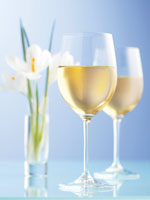For example, people who choose sweet wines seem to be more impulsive but less open to new experiences than those who select a drier vintage, according to a study published in Food Quality and Preference. “We now know that impulsivity relates to a preference for sweetness,” says lead researcher Anthony Saliba, PhD, a consumer sensory specialist at the National Wine and Grape Industry Center at the Charles Sturt University, in Wagga Wagga, Australia. “This is a pretty big step forward in understanding how a preference for sweet taste develops.” In the study, Saliba and colleagues asked 45 men and women with an average age of 43 to complete two questionnaires: the IVE, which measures impulsiveness, venturesomeness, and empathy; and the Big Five, which measures openness, conscientiousness, extroversion, agreeableness, and neuroticism. Then the participants had a choice of two types of white wine: a dry, fruity Spanish wine (Gran Tesoro Viura, 2007) or a “sweet” wine, which was the Viura with some added sugar. Overall, there were no differences between the two groups based on their choice. However, the researchers did find two characteristics that seemed to matter: impulsiveness and openness. People who preferred the sweet taste had greater impulsivity but less openness. People who score lower on the openness trait are more hesitant to try new things. “This suggests that people who like sweet foods are less likely to try new tastes,” says Saliba. A 2002 study in Personality and Individual Differences found that people who score lower in openness tend to have unhealthier eating habits compared to those with high scores. link.. Do you crave pinot grigio or prefer a nice Riesling? Turns out a glass of wine may be more than just a drink—your choice could shed light on your personality too.
Do you crave pinot grigio or prefer a nice Riesling? Turns out a glass of wine may be more than just a drink—your choice could shed light on your personality too.
skip to main |
skip to sidebar
Main Menu
Categories
- Addiction
- Adolescents
- Allergies
- Asthma
- Bacterial Vaginosis
- Birth centers
- Breast
- Breast Cancer
- Breastfeeding
- Cancer
- Chronic Pain
- Depression
- Diet AND Weight Loss
- Diseases
- Doctor or Midwife
- Excercise
- Facts
- Fetal monitoring
- fitness
- Hair Growth
- HEALTH ASIA
- Health News
- Healthcare Device
- Healthy Eating
- Healthy Living
- Herbal Health Tips
- Homeopathy
- Injuries
- Media centre
- Medications and Drugs
- Mental Health
- Midwife
- Mind and Body
- Miscarriage
- Pregnancy
- prenatal care
- Quit Smoking
- Seven principles to eating well during pregnancy
- Sex And Pregnancy
- Sex Life
- Sexual Health
- Sexually diseases
- Signs of Depression
- Smells
- Tips for Great Postpartum Sex
- Top ten signs you might be pregnant
- Treatments
- Twelve steps to a healthy pregnancy
- vagina Infection
- Virus in Humans
- Vitamins
- Weather
- Women Health
- Yoga
Disclaimer
My blog is a collection of sites and URLs that provide softwares, wallpapers, News, Health, Latest Technologies, Fasion, Beauty Tips, Live Tv Channals and more free on the net. I am not providing these content , I just collect and post URLs from third party providers. I am not responsible for the content, the terms of screening of those contents nor for their quality. I don't sell nor rent these contents. In order to use my blog you must agree with these terms of condition.I have not hosted content thus I am not responsible for any violation.


